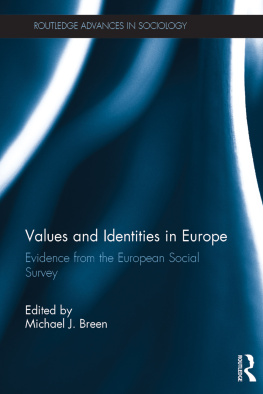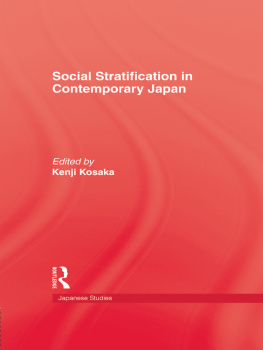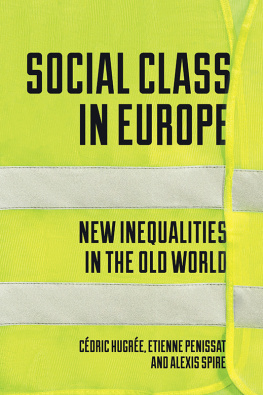SOCIAL ORDERS AND SOCIAL CLASSES IN EUROPE SINCE 1500
First published 1992 by Longman Group Limited
Published 2013 by Routledge
2 Park Square, Milton Park, Abingdon, Oxon OX 14 4RN
711 Third Avenue, New York, NY 10017, USA
Routledge is an imprint of the Taylor & Francis Group, an informa business
Copyright 1992, Taylor & Francis.
All rights reserved. No part of this book may be reprinted or reproduced or utilised in any form or by any electronic, mechanical, or other means, now known or hereafter invented, including photocopying and recording, or in any information storage or retrieval system, without permission in writing from the publishers.
Notices
Knowledge and best practice in this field are constantly changing. As new research and experience broaden our understanding, changes in research methods, professional practices, or medical treatment may become necessary.
Practitioners and researchers must always rely on their own experience and knowledge in evaluating and using any information, methods, compounds, or experiments described herein. In using such information or methods they should be mindful of their own safety and the safety of others, including parties for whom they have a professional responsibility.
To the fullest extent of the law, neither the Publisher nor the authors, contributors, or editors, assume any liability for any injury and/or damage to persons or property as a matter of products liability, negligence or otherwise, or from any use or operation of any methods, products, instructions, or ideas contained in the material herein.
ISBN 13: 978-0-582-08343-1 (pbk)
British Library Cataloguing in Publication Data
Social orders and social classes in Europe since
1500: Studies in social stratification.
I. Bush, M.L.
305.5094
Library o f Congress Cataloguing-in-Publication Data
Social orders and social classes in Europe since 1500: studies in social stratification/edited by M. L. Bush,
p. cm.
Papers from a conference held in Manchester, Sept. 1921, 1988, and organized by the History Dept. of Manchester University
Includes bibliographical references and index.
ISBN 0-582-08344-3 (csd). ISBN 0-582-08343-5 (ppr)
1. Social classes Europe History Congresses. 2. Social structure Europe History Congresses. I. Bush, M.L.
II. University of Manchester. History Dept.
HN380. Z9S6466 1991
305.5094 dc20 91-2404 CIP
Set in Linotron 202 10/12 Bembo
Contents
The origins of this book lie in a conference held in Manchester 1921 September 1988, and organised by the History Department of Manchester University. The purpose of the conference was to take another look at the concepts of order and class and to reconsider their usefulness for stratifying societies and explaining social relationships in early and late modern Europe. Through the medium of such a subject, it was intended to bring together specialists of different periods and countries so that they could participate in the same discussion; and this is what happened. It was left to the speakers to decide how to approach their subject. The outcome was a variety of studies, some comparative, some focused upon a single society. However, because of the way in which the conference was structured, the majority of speakers were obliged to concentrate upon one basic social group: nobility, clergy, the middle classes, the peasantry, the proletariat, the poor. To avoid creating a book which was merely a compilation of conference papers, the speakers were given a year in which to transform their talks into properly referenced, carefully expressed and interrelated chapters.
Thanks are due not only to the conference speakers but also to the following conference participants whose comments on the papers bore influence as the latter came to be reworked into the contents of this book: J. V. Beckett, John Breuilly, Andrew Charlesworth, John Garrard, Peter Gatrell, Sharon Gewirtz, Ralph Gibson, Robbie Gray, Don Hartley, Joanna Innes, Pat Johnson, R. Keys, A.J. Kidd, Keith McClelland, Peter McMylor, D. Nichols, Frank OGorman, J.P. Osmond, Vivienne Parrott, Margaret Pelling, Maureen Perrie, Colin Phillips, Iori Prothero, Brian Pullan, David Rheubottom, Patrick Riley, Michael Rose, Valerie Saunders, Timothy Scott, Virginia Smith, David Sturdy, P. Summerfield, Amanda Vickery, James Vernon, Richard Wall, John Walter and Roger Wells.
M.L. Bush
Manchester, June 1990
Peter Burke
University of Cambridge
Une hirarchie sociale, aprs tout, est-elle jamais autre chose quun systme de reprsentations collectives, par nature mobiles? (Marc Bloch)
It was in 1966 and 1967 that two rival conferences on the subject of social stratification were held in Paris and Saint-Cloud, organised respectively by Roland Mousnier and Ernest Labrousse. Labrousse concentrated on orders and classes, Mousnier included castes as well.1 However, as in the case of industrialisation, coming later has its advantages. Today, a discussion on the subject of orders can make use of some first-rate studies published since 1967, notably Georges Dubys well-known book Les Trois Ordres, particularly interesting on the political context in which the idea was formulated, and an important (if less celebrated) study of priests warriors and peasants by Ottavia Niccoli.2
More important still, we can take advantage of a shift in the theory of social stratification over the last generation, a linguistic turn which involves taking the creativity of language and metaphor more seriously than used to be the case. Instead of viewing language as a mere reflection of social reality, recent sociological and anthropological theory stresses the role of images, models (or collective representations, as Durkheim called them) in constituting the social order they purport to describe. It is for this reason that any critique of the concept of order needs to be introduced by some reflections on the history of the concept, and on the intellectual package of which it forms a part.
It may be useful to tell this story backwards. One might begin with a book recently published by Ernest Gellner, Plough, Sword and Book, a brilliant discussion of the structure of world history, in terms of the division of labour between production, coercion and cognition. However, like the celebrated Indo-Europeanist the late Georges Dumzil, Gellner is concerned more with the three functions than with the particular social groups who perform them.3
Hence a more useful point at which to start may be the work of Roland Mousnier, who has devoted so much of his life to arguing that the old regime in general and France in particular must be seen as a society of orders, as distinct from one of classes or castes.4 This chapter makes a number of criticisms of Mousnier. Today he is in danger of becoming a historiographical villain or, at any rate, an Aunt Sally, so it may be worth saying, before going any further, that Mousniers argument about orders has had the great virtue of forcing us all to clarify our ideas about old regime society.
Mousnier has two main sources of inspiration: seventeenth-century lawyers, notably Charles Loyseau, and twentieth-century sociologists, notably Bernard Barber (whose study, Social Stratification, had itself drawn on Mousniers work in its brief discussion of Estate Society), but going back behind him to the functionalist school of Talcott Parsons and behind Parsons to Emile Durkheim.5
Parsons and his followers accepted the essential contrast between two types of social structure, class society and estate society (




